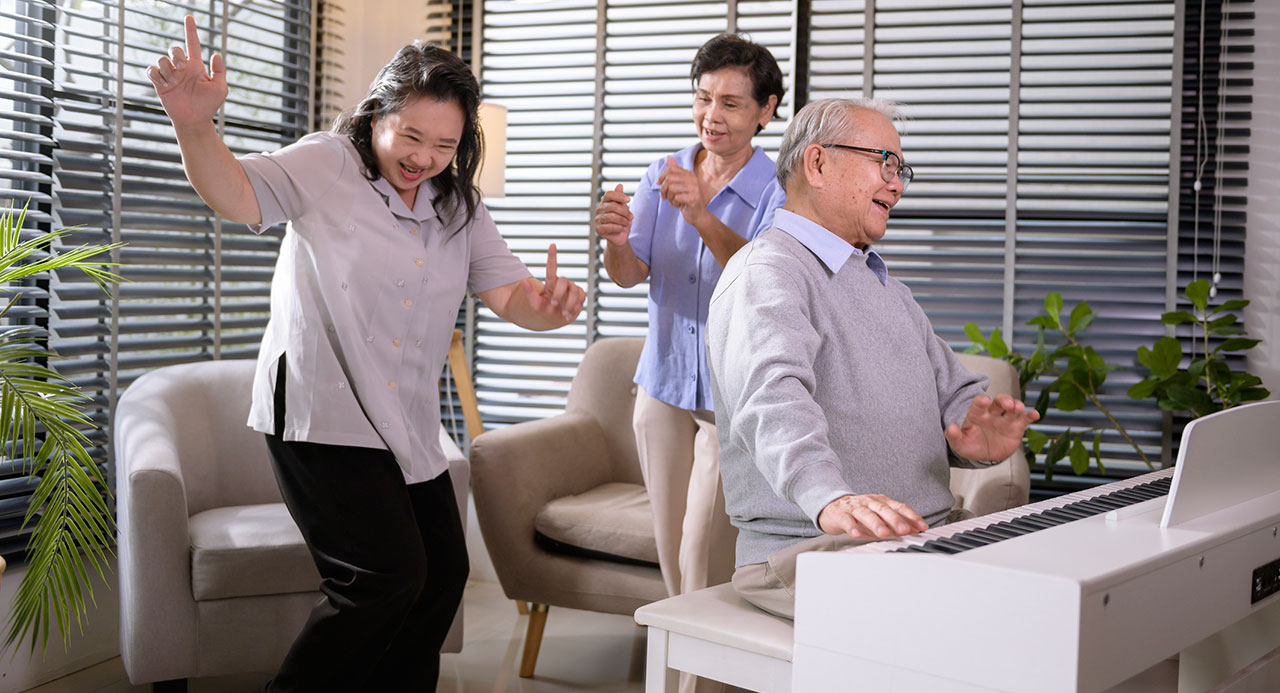It may be hard to think of music as anything other than entertainment. But music is a powerful therapy that can work wonders, especially for seniors. It can be used to relax a person who is anxious, reduce pain, improve memory, and relieve depression.
Your Prescriptions Sorted and Delivered
And one of the best parts is that there are several easy ways to begin. We can choose to listen, sing, or play an instrument. This article explores various ways music therapy can enhance the well-being of older adults. Read on to learn more about the immense benefits of music therapy for seniors.
8 Benefits of Music Therapy for Seniors
Music therapy offers a wide range of benefits, including:
1. Reducing Anxiety and Stress
Music therapy can be calming for both the body and mind. Anxiety is often distressing to seniors and can come from many causes, such as illness, memory loss, or a change in routine. Having soft music playing or listening to a familiar song has been shown to relax breathing and quiet a racing heart. Music therapists often use playlists tailored to an individual person or guided activities to help ease tension.
Active music-making (playing instruments or singing) can be even more helpful. A scientific review of music therapy found that active music-making had a significant effect in reducing anxiety in older adults and showed more benefits for enhancing emotional well-being and reducing stress compared to passive listening.
2. Enhancing Memory and Recall
Music can reach deep memory pathways in the brain. Seniors with Alzheimer’s or dementia can often enjoy and remember favorite songs, even when other memories seem to have disappeared. Hearing a tune from the past can evoke rich details of people, places, and emotions for individuals, and has long been used in many cultures to preserve their history.
Research has shown that familiar music improved the recall of life histories by patients who had Alzheimer’s. After listening to music from their youth, participants recalled more personal memories and showed higher levels of verbal engagement.
3. Improving Mood and Emotional Well-Being
Music may be able to change someone’s mood in a matter of seconds. When we are dealing with various emotions, we can use music as an outlet to express how we feel. It can also help validate the emotional experience we are having and help us overcome irritability or restlessness.
A scientific study showed that regular music sessions can enhance emotional health in older adults with dementia. Participants in this study reported experiencing more positive emotions and improved social engagement after attending 25-minute singing sessions for 3 weeks.
4. Helping Manage Chronic Pain

Living with chronic pain is a reality for many older adults. Music therapy can be an effective drug-free method to help us cope with this discomfort. Slow rhythmic music can distract the brain from pain and promote general relaxation.
Research found that seniors who received guided music therapy reported lower perceived pain intensity. These sessions helped distract them from discomfort and lowered the emotional distress caused by chronic pain. Combining music therapy with targeted movements (such as these back exercises for seniors) can also help manage pain better.
5. Supporting Better Sleep
Older adults may have sleep problems because of psychological stress, physical discomfort, or medication effects. Music can often promote healthier sleep schedules. Listening to calming music before bedtime helps relax the mind by reducing the heart rate and stress hormone levels. For some older adults, relaxing instrumental music or a music meditation guide is often more effective than sleeping pills.
A systematic review found that older adults who listened to relaxing music for 30 – 60 minutes before bedtime slept longer, more deeply, and with less stress than those in a control group. The relaxing music used was described as sedative music, which usually has a slower tempo, smoother melodies, and repetitive rhythms.
6. Stimulating Cognitive Function
Music therapy works both the right and left sides of the brain, which makes it a comprehensive mental fitness routine for seniors. Singing lyrics, clapping to a rhythm, or playing a musical instrument can exercise memory, attention, and sequencing skills. This type of interaction also supports the ability of the brain to adapt, called neural plasticity, which helps keep the mind sharp.
For seniors with mild cognitive impairment, music therapy may slow the decline in brain function. A study revealed that music-based brain training significantly improved cognitive performance (including attention, processing speed, and executive function) in older adults.
Medbox: Never Sort Medications Again
7. Promoting Physical Movement and Coordination
A natural response to lively music is movement, so it can be an ideal way to encourage physical activity. We can tap our feet, sway, clap, or do simple rhythmic exercises. These actions can improve everyday balance and muscle skills, which we need to complete daily tasks and avoid falls.
Music therapy sessions may include drumming, dancing, or other rhythmic exercises that enhance flexibility and circulation. Seniors with limited mobility still may benefit from small, repeated movements to music, such as finger tapping, ankle movements, or hand-held percussion.
8. Encouraging Social Interaction
Social isolation is an increasingly major concern among seniors, especially those living alone or in assisted living communities. Music therapy gives people a shared experience that can help them create connections with each other. These activities can build natural bonds among group members, with conversation and group interplay that are essential for good emotional health.
Even nonverbal group members tend to be more responsive with facial expressions and body movement, and can feel included in the group when participating in musical activities. Social connections with other people naturally help decrease loneliness and provide a sense of belonging. Group music therapy sessions may lead to closer relationships and a more lively, social community over time.
Conclusion
Music therapy for seniors is more than just a fun way to spend an afternoon. Several bodies of research have proven beyond a doubt that music holds tangible benefits that improve the health and quality of life of both healthy and frail older adults. Seniors who may struggle with multiple issues, such as memory loss and anxiety, can find music therapy to be a helpful treatment method.


